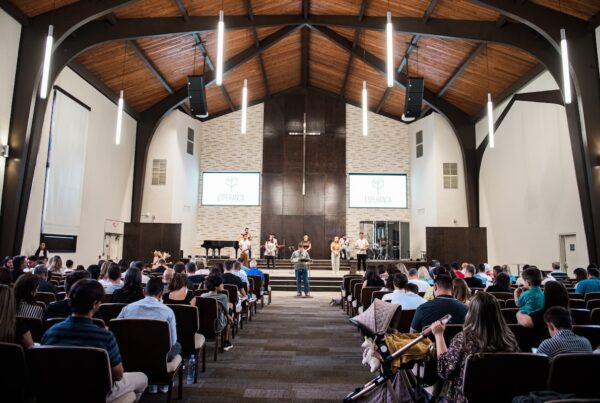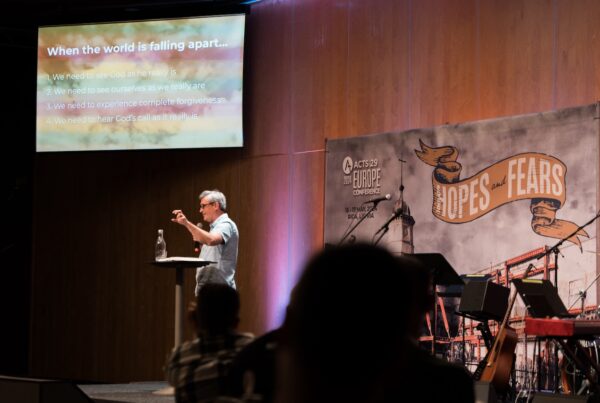Church planting is an interesting work. It takes faith, it takes risk, it takes prayer and focus and it can take a lot out of the men and women involved the work. Over the last twenty years I’ve been involved in several missionary endeavors from college campuses, to international partnerships and most recently domestic church planting. As I prepared for the work of planting the gospel I read everything I could find, hammered all the MP3s I could find about church planting but perhaps the best advice we received was: “Make sure you are healthy before you plant.” It sounded important. I probably didn’t know what it meant.
The best advice we received was: “Make sure you are healthy before you plant.”
In the midst of all that is involved with missionary church planting work, your own health as a minister and shaping a culture that will serve the health of leaders can slowly drift off the church planter’s radar. After all, there are people to reach for Jesus, faithful gospel proclamation with which to engage, focused contextualization of the gospel to connect and communicate with people in culture, a myriad of functional structures to create, put in place and shape for ministry effectiveness. Finances must be managed, leaders developed and trained, networking and evangelism, Sunday morning teams, leading missional community and growing as a preacher all rush over the life of a planter in the early years. What we do not think about enough is how to shape a culture in the new plant that grows to care for leaders and helps encourage the planter to rest well, walk in heart holiness and keep love for Jesus and neighbor the first and foremost priorities.
The work of the church is described as toil and labor in the Scriptures and planting the gospel is an arduous task. (Colossians 1, 2 Timothy 2, 2 Cor 11:22-31) There are regular attacks from the world, the flesh and the devil. Even in-house friendly fire from God’s people will wear on leaders in the church as we know even herbivorous sheep teeth can hurt when they gnaw on your leg bone long enough. Yet God in his grace has given us his Spirit, his Word and the gospel community to walk with to create a culture of confession, grace, hope, love, honesty and empathy. If we walk this path together with a community of leaders, we will care for one another in ways that will allow us to traverse the ministry journey in a healthy way. If we create a culture in the church plant that actually cares for YOU, the planter, the gospel can remain large before us and our need for grace the actual driving force in our ministry.
The Need
It doesn’t take long to find a church planter who is wearied, worn out and in need of some encouragement. The pastorate in general can be what Paul Tripp describes as “A Dangerous Calling.” While it is encouraging to see some recent surveys which show an uptick in minister encouragement, there are still some very concerning data related to minister health. 1 A long term survey of 2000 pastors by London and Wiseman revealed that pastors can be isolated, lonely, discouraged and overwhelmed by their work. 2 Scott McConnell, LifeWay Research vice president, commented on ministry work by saying, “This is a brutal job, the problem isn’t that pastors are quitting—the problem is that pastors have a challenging work environment … Churches ought to be concerned and they ought to be doing what they can [to help].” 3
What follows are some suggestions and things we’ve learned along the way with our own elder team as a young church plant. We’ve learned some things by wisdom and instruction and we’ve learned some the hard, old fashioned way as pain, difficulty and the kind discipline of the Lord have been our teacher. These are by no means comprehensive but I do hope they are helpful to church planters and their teams to shape cultures of care for leaders in local congregations.
Lead from Among the People as a Sheep-Shepherd
Being in relationships with other elders, deacons and members of the church is not optional for God’s leaders.
The Apostle Peter gives us clear instruction related to the manner in which elders should live out their ministry in the fifth chapter of his first epistle (see 1 Peter 5:1-5). He gives us exhortations to shepherd God’s flock, to give oversight willingly and eagerly, to do our work as examples to the flock and not as a domineering overlords to God’s people. In this section there is a simple word that I find absolutely essential to the life of a pastor: among. The call we have as pastors/elders is to shepherd the flock of God that is among you. This is a term that implies the presence of a minister with God’s people and shows that his place is within the flock. Part of Jesus’s care for his leaders is not to set them off from the church even as they are ordained and called as leaders. This means being a part of the gospel community. Being in relationships with other elders, deacons and members of the church is not optional for God’s leaders. “I’m a high level, important leader so I don’t need to be in community…blah, blah blah” should not be an option for us. If we neglect the “among” nature of the work, we will also put our own lives at great peril as we neglect the primary care mechanisms for our own lives and families. This means we must fight for a culture with our leaders that gives presence, time, honesty and a place where we can be vulnerable and be sheep with our team.
In order to establish this, a church planter has to teach and train others about his own need. You need to tell your lead teams or elders (once established) that you need them to look after you and this needs to be part of their training. You must fight for the times that you meet and gather for prayer and work together. Busyness cannot rob the team of the time it needs to know and care for one another. More on this later. Finally, as a planter, you must be honest about how you are doing and you will need to be much clearer than you think. Your leadership strength and abilities may skew others view of you and they will always assume you are doing OK unless you are hyper-clear that you are not. Pastor Wayne Cordeiro in his book “Leading on Empty” recounts in his own story that he began to sense his own burnout before anyone else did and that he kept telling the people around him that he needed to stop. 4 I too have found that you almost have to sound alarm bells to get your team to know your need for rest and care but sound them indeed. You need your team to care for you along the way.
Love your Staff and Your Team
Whether you have a core team of volunteers, or an established church leadership team, a functioning elder board, you need to love one another and give some structure to the team that creates a healthy culture. There are both structural issues and character issues that can create an unhealthy church culture that will not serve anyone well. We need to move beyond being mere co-workers and move deeper to be brothers and sisters working as family in the fields of Jesus. By this I do not mean everyone is going to be BFFs, go on vacations together and be at every family function of everybody. But I do mean creating structures that allow spiritual growth together and addressing character and sin issues that will create spiritually toxic realities for all.
Structural Issues
If you want a team that cares for one another and is both healthy and effective, separate the staff meeting and the prayer meeting. The goals of these two gathering points are very different and separating them on the weekly calendar will do wonders for growing as a team on mission. Your staff meeting is a laptop open, task allocation and working meeting. It’s not prayerless in any way, but it is a time to get things done. The prayer meeting is a laptop closed meeting where we engage with the Lord regarding our walks with him, our families and we pray for one another and the church. Yes, this requires “another meeting” but it should have an entirely different feel. Listen to songs, sing and prayer together. Confess sins and struggles, reassure the hurting, listen to marriage difficulties and the trials faced in raising kids. I’ve even found it healthy to meet in a different location, even to have the prayer time on couches and not around the same conference table. We’ve read books and theological essays and we rotate leadership and responsibility for the prayer time. Staff moving away, bi-vocational schedules and transitions have been a challenge to carve out this time but it has always been worth it. It allows a forum where we are just sisters and brothers in the Lord seeking him in our time of need.
Character Issues
There are so many things that challenge our souls and our teams. Busyness of soul and schedule, lustful hearts, drifting marriages, distance and harshness with our kids and quarrelsome conflict all emerge in life together as sinful human beings. We have to address these things together as a leadership community. The primary challenges we’ve faced to love one another as a team has flowed from busyness as an excuse for just about everything and keeping parts of our lives separate from one another. How are we doing with wives, kids, our heart towards Jesus? Are we too busy to be around and accountable to God together? It is not love to leave these things unaddressed. It may be very difficult to call a hyper-busy, wandering team in and to one another yet it is loving to have the courage to say something and fight for change.
Pastors and planters need to live among the church and need to work at shaping a culture of love and care as we go about the hard charge up on the mountains of ministry. However, there is also a final word I’d like to share to those who are elders. You need to make care for you staff pastors and leaders a focused priority.
Elders, Make Care for your Pastor a Priority
There is a right fear of stroking the ego of a pompous pastor. There is a right concern about making an evangelical celebrity out of mere men and their gifts in the church. There is a monumental pause about making an unassailable monster in our midst who can “do no wrong” as he does so much wrong in the church. If we see THAT sort of thing in our pastors, by all means address THAT. Yet we simply cannot withhold love, appreciation, blessing and encouragement from a pastor because of these fears and concerns. A pastor is biblically due a certain respect and honor due to his calling and he needs your love and encouragement as a human being. Dave Harvey, with our friends over with the Sojourn Network, has put together a wonderful white paper entitled “Elders, Care for Your Pastor” which is a great resource for how to care for pastors. I highly recommend it to you if you are an elder or know someone who is. There are many ways to bless your pastor, knowing his heart and what actually blesses him will go a long way to keep him encouraged. Here are a few, maybe even silly sounding, ways that our team has blessed me over the years:
- One of our elders drops simple texts of encouragement after tough meetings
- One of our members gave us a gift certificate to a “nicer” restaurant when we were on vacation
- Help with their kids to get he and his wife out for a date. This is especially important if they live far from family
- Give him a little extra cash for vacation. My wife’s boss did this for us and it felt so encouraging
- Ask your pastor what actually blesses him. It may surprise you and it may not be getting a raise. For me I’ve been so blessed by some of our people in ways that go much further than a dollar. One of our members cut my grass for me one summer with my dilapidated lawn mower. When I got home he had bought me an amazing new lawn mower. One of my elders roped me into football/soccer fandom and bought me one of those overpriced Adidas soccer shirts/kits for our team. I love that. One of my elders gave me Office 365 for free – Mac people don’t hate, Office 365 is great on iOS, Mac, PC etc. One of the guys here that worked on facility issues with me for years gave me a couple of red screws that were used to attach a new roof here. These screws meant the world to me because they represented our friendship, some hard work done together and they reminded us both of God’s grace to our church.
In a church planting setting…create a culture from the beginning that cares for leaders.
In closing, there are so many things to pray about and work on in a church planting setting. One of the things that you should keep before you is to create a culture from the beginning that cares for leaders. This may seem awkward as you have to engage in teaching others how to care for YOU. This can feel self-serving, it can feel just awkward and it can seem like someone else should be running that training. But as H.B. London recounts, “every pastor needs to know that the leadership is praying for them, affirm them, encourage them and recognize the work being done—those are the things that give a pastor hope or give a pastor a sense of being wanted.” 5 So as you train people for mission, service and engaging the world with the gospel, don’t forget to care for your team and teach them to care for you along the way. This is part of watching our life and the teaching. In doing so, as Paul once rightly said, you will save yourself and your hearers. (1 Timothy 4:16) You will also receive God’s grace and blessing together as his servants along the way.
1 Lifeway (2015), Despite Stresses, Few Pastors Give Up on Ministry, Accessible at: http://lifewayresearch.com/2015/09/01/despite-stresses-few-pastors-give-up-on-ministry/
2 London, H. B., & Wiseman, N. B. (2003). Pastors at greater risk. Ventura, CA: Regal.
3 Lifeway (2015), ibid
4 Wayne Cordeiro, Leading on Empty, (Bethany House: Bloomington, MN, 2009) 42
5 Lifeway (2015), ibid










